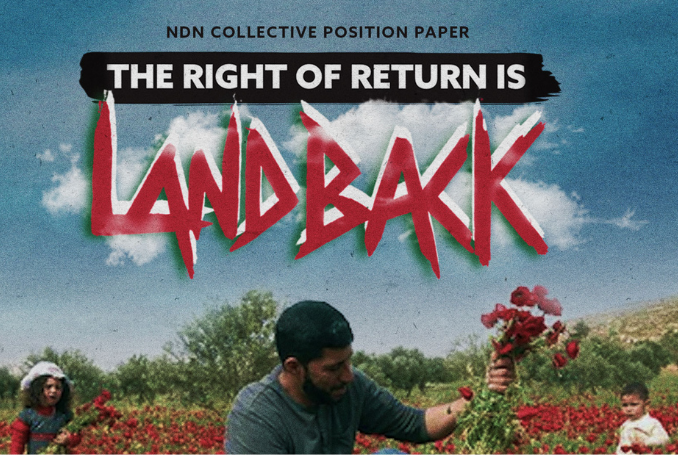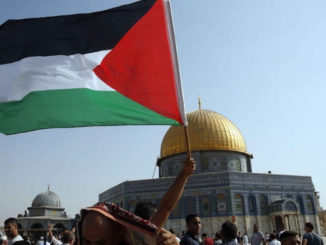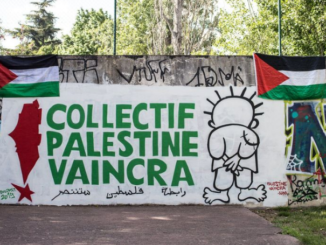
By Omar Zahzah
A History-Making Paper
On March 30, 2022, on the occasion of Palestinian Land Day, the Indigenous organization NDN Collective released a history-making position paper affirming the interconnectedness of the Palestinian struggle to global Indigenous liberation.
The position paper is prefaced by a quote by revolutionary Palestinian writer and martyr, Ghassan Kanafani, and is introduced by a short section that immediately demolishes the myth of Indigenous dispossession and genocide being a “complicated” issue.
Whether discussing the slow-motion genocide of Indigenous resistors whose vital, life-giving resources are contaminated by a genocidal North American settler-regime, or Zionism’s settler-colonial apartheid system inflicted upon the native Palestinian people, the root causes of injustice are far from “complicated.”
In both cases, violent dispossession and genocide is directly inflicted by alien, racist settler-colonial regimes that seek to completely eradicate Indigenous populations to fortify the blood-soaked borders of illegitimate, racist states.
Why March 30, 2022?
The spirit of joint struggle animating NDN Collective’s position paper is evident in the intentionality of its composition and release. Not only is there careful, studied attention to revolutionary Palestinian history and present-day conditions of dispossession and ongoing resistance; releasing the paper on March 30th, 2022 is in and of itself a profound gesture of revolutionary generosity and solidarity.
“Today on Palestinian Land Day (يوم الأرض),” NDN Collective tweeted in observance of the launch of the position paper, “we uplift the ongoing struggle of our Palestinian relatives for return and liberation. We reaffirm that our solidarity runs deep. #FreePalestine”
For Palestinians, March 30 is Land Day, and Land Day 2022 marks the 46th anniversary of the date upon which six brave Palestinian resistors were martyred by the Zionist entity’s occupation police while protesting the colonial state’s intent to expropriate thousands of dunks of Palestinian land.
Land Day is thus a multi-layered occasion.
As Samidoun rightfully notes, Land Day entails commemoration of “Kheir Mohammad Salim Yasin, Khadija Qasem Shawahneh, Raja Hussein Abu Rayya, Khader Eid Mahmoud Khalayleh, Muhsin Hasan Said Taha and Raafat Ali Al-Zheir and all the martyrs of Palestine who have given their lives and their freedom for the defense of Palestine, its land and its people.”
But Land Day is also, as Jeanine Hourani writes,
“about the two most central aspects of our struggle: unification and land. Land Day provides me with an opportunity to reflect on the historical significance of the day, and what it means for Palestinian liberation in a contemporary context.”
The linkages identified within the NDN Collective position paper are not simply about dispossession–they’re also about persisting struggles to reclaim stolen land. Land is thus the site of ethnic cleansing, but also the arena and catalyst for unbreakable bonds of unified resistance and impending liberation. Land is an anchor between Indigenous strugglers from Turtle Island to Palestine because, as the paper maintains,
“The very core of who we are as Indigenous Peoples ties back to the land, relationships to the plants, animals, rivers, seas, spiritual places, rooting our livelihood, encompassing kinship systems, economies, language, and culture in that land.”
This is also the first Land Day since the Unity Intifada, which has shown the world that Palestinians are more united than ever in bold rejection of the Oslo Accords paradigm that includes the unshakeable conviction in the total Right of Return.
Building on Co-Resistance of the Past
NDN Collective’s position paper threads important commonalities between Zionist and Euro-American settler logics of settler-colonialism and genocide. This would be an important move in and of itself. But crucially, the paper also makes sure to acknowledge the co-resistance of Indigenous peoples from Turtle Island to Palestine that has taken place in preceding decades so as to more firmly root the paper’s present imperative for joint struggle within a context of historical continuity.
“During the 1974 Treaty Council meetings at Standing Rock, Palestinians supported AIM in providing security,” the paper notes.
“In 2016, Palestinian youth showed up at Standing Rock in solidarity with the No DAPL Movement. Palestinians showed up for Wet’suwet’en Relatives to block the Coastal Gaslink pipeline from illegally crossing their territories. And then on July 4th of 2021, in Rapid City, SD, a Palestinian Relative was one of 4 people to hang an upside-down u.s. flag with ‘LANDBACK’ written across. This was a statement to the town known as “The City of Presidents,” that this land is not their land, and it will be returned to the Original Peoples.”
The position paper’s historical import thus lies not only in its issuance, but also in being tied to previous incarnations of co-resistance that its release helps to anchor, archive, and vindicate.
Defending Indigeneity from Settler Cooptation
Another crucial aspect about the position paper is its clear demarcation between Zionist colonial (or “settler”) identity and Palestinian Indigeneity. As of late, a particularly insidious tactic deployed by Zionists has been to falsely claim the mantle of a unified “Indigenous” people returning to a land from which they had been historically dispossessed thousands of years prior.
This nonsensical religious colonial narrative has been recently redeployed as a reactionary rebuttal to Palestinian political uses of the term Indigenity. For the Palestinian people, Indigeneity as a concept is intended to clarify that the Palestinian struggle is inextricable from land and thus involves the joint liberation of land and people.
By contrast, Zionist colonial abuses of the term confuse categories of colonizer/settler colonized/Indigenous in order to obscure the true nature of the ongoing Zionist colonization of Palestine and justify Zionism’s Jewish-supremacists rule upon and theft of Palestinian land. That is, Zionists coopt a framework for Palestinian liberation in order to give genocidal Jewish supremacy the false veneer of Jewish liberation. But in truth, Zionist Indigeneity is just as laughable and just as racist as white US settlers falsely claiming Cherokee lineage as a means of blurring the structural positions of colonizer and colonized.
NDN Collective members also importantly connected the historical erasure that settler-colonial regimes employ to the obscuring of legacies of Indigenous solidarity to which this paper is also intended to serve as a corrective. As NDN Collective’s Landback Campaign Director Krystal Two Bulls observed during a live conversation about the significance of the paper,
“The ability to revise history is something that colonizers are really good at. And so for us, this paper represents our ability to be able to share our own histories, our own stories, our own relationships to each other that we know. We know that Palestinians taught us how to navigate the United Nations. We know that Palestinians showed up for us at Standing Rock. At Wet’suwet’en. In Rapid City more recently. We know those stories, and we will continue to move in that way.”
NDN Collective’s position paper disables settler cooptation of Indigenous identity and resistance through its direct assertion that the Palestinian struggle is an indissociable component of global Indigenous liberation and decolonization.
Why is the Palestinian Right of Return Landback?
Finally, what does it mean, as the NDN Collective position paper provocatively proposes, to think of the Palestinain Right of Return and Landback as direct extensions of one another?
One immediate answer seems to be going beyond happy sloganeering. The juxtaposition of both concepts is far more than a series of hashtags. As the paper notes in the conclusion, “Although our Peoples come from different nations and geographies, the struggles against settler colonialism are the same.”
To say that the right of return is landback thus represents a principled affirmation of how the ethics that ground the Indigenous claim to all of Turtle Island are the same as those that frame the Palestinian claim to all of Palestine, from the river to the sea.
Read the full version of the paper here ..

– Omar Zahzah is the Education and Advocacy Coordinator for Eyewitness Palestine as well as a member of the Palestinian Youth Movement (PYM) and the US Campaign for the Academic and Cultural Boycott of Israel (USACBI). Omar is also an independent scholar, writer and poet and holds a PhD in Comparative Literature from the University of California, Los Angeles (UCLA). He contributed this article to The Palestine Chronicle.







